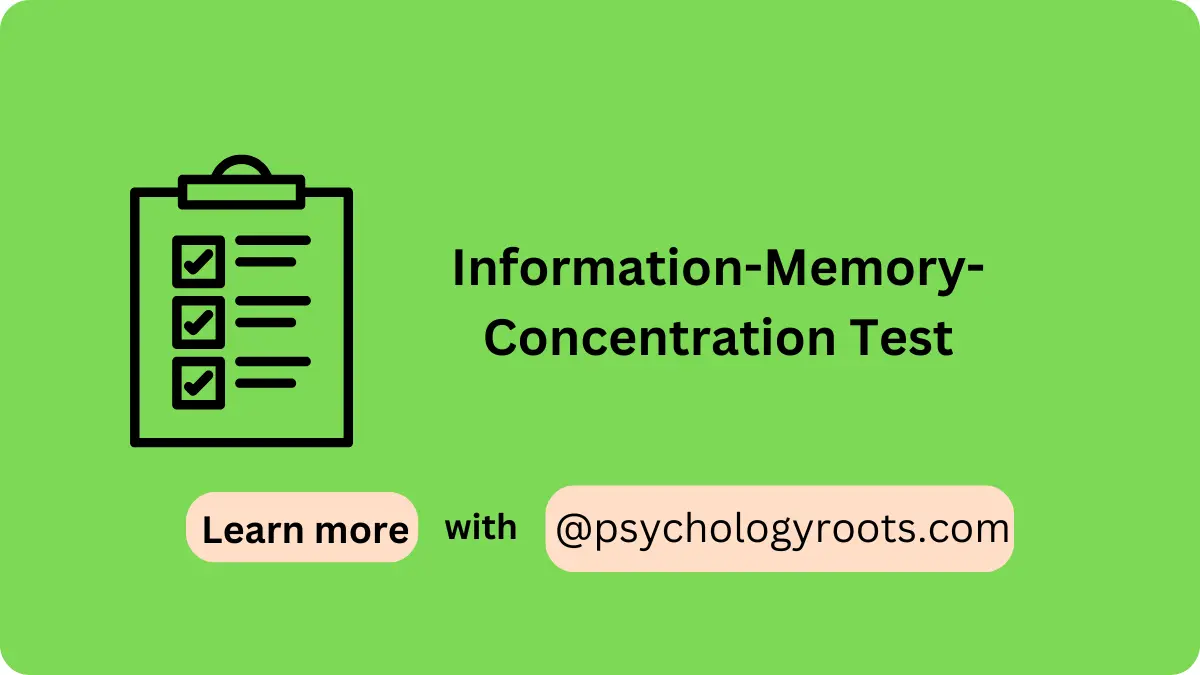Table of Contents
Information-Memory-Concentration Test
Here in this post, we are sharing the “Information-Memory-Concentration Test”. You can read psychometric and Author information. We have thousands of Scales and questionnaires in our collection (See Scales and Questionnaires). You can demand us any scale and questionnaires related to psychology through our community, and we will provide you with a short time. Keep visiting Psychology Roots.
About Information-Memory-Concentration Test
Scale Name
Information-Memory-Concentration Test
Author Details
G. Blessed, B. E. Tomlinson, and M. Roth
Translation Availability
English

Background/Description
The Information-Memory-Concentration (IMC) Test, developed in 1968 by G. Blessed, B. E. Tomlinson, and Martin Roth, stands as a foundational instrument in the field of cognitive assessment. It was designed to provide a quantitative measure of intellectual and personality deterioration, specifically in the context of senile dementia.
The test emerged from clinicopathological studies aiming to establish a clear link between the severity of clinical dementia symptoms and the degree of cerebral pathology, such as the formation of senile plaques in the brain. The IMC Test is actually one component of a larger assessment battery, often referred to as the “Blessed Test” or “Blessed-Roth Dementia Scale,” which also includes ratings of a patient’s capacity for everyday activities.
The IMC itself combines three cognitive domains: Information (which assesses orientation to time and place), Memory (evaluating both recent and remote recall), and Concentration. Due to its components, the test is sometimes referred to by different names, including the Orientation-Memory-Concentration (OMC) test or simply the Blessed Test, which can cause confusion. However, its primary function remains to offer a brief, yet powerful, screening for dementia severity in both clinical and community settings.
Administration, Scoring and Interpretation
- First, obtain a standardized copy of the Information-Memory-Concentration (IMC) Test protocol and scoring sheet to ensure procedural fidelity.
- Second, explain the purpose of the assessment to the individual in a clear, simple, and reassuring manner. You might say, “I am going to ask you a few questions to get an idea of how your memory and thinking are doing.”
- Third, provide straightforward instructions before beginning each section of the test, ensuring the individual understands what is being asked of them.
- Fourth, inform the individual that the assessment is brief, typically taking around 10 minutes to complete, which can help reduce any potential anxiety.
- Fifth, administer the scale in a quiet, private, and distraction-free environment to facilitate optimal performance. It is critical to record the individual’s responses accurately and to use information from a reliable collateral source (such as a close family member) to verify the accuracy of personal memory items for valid scoring.
Reliability and Validity
The IMC Test demonstrates robust psychometric properties. In terms of reliability, it has shown high internal consistency, with a Cronbach’s alpha of 0.93. Test-retest reliability is also strong, with reported coefficients ranging from 0.82 to a very high 0.96 over two- to four-week intervals, indicating that the test provides stable and consistent scores over time. Studies comparing it to other cognitive screeners found its reliability to be slightly higher than that of the Mini-Mental State Exam (MMSE).
Regarding validity, the IMC Test’s scores correlate significantly with quantitative measures of neuropathology, specifically the density of senile plaques in the cerebral grey matter, establishing its strong criterion validity. Furthermore, it shows good concurrent validity through high correlations with other established cognitive measures like the MMSE and demonstrates strong discriminant validity by effectively distinguishing between individuals with dementia and healthy, non-demented older adults.
Available Versions
29-Items
Reference
Blessed, G., Tomlinson, B. E., & Roth, M. (1968). The association between quantitative measures of dementia and of senile change in the cerebral grey matter of elderly subjects. The British journal of psychiatry, 114(512), 797-811.
Important Link
Scale File:
Frequently Asked Questions
What does the Information-Memory-Concentration (IMC) Test measure?
The IMC Test measures cognitive impairment across three key areas: orientation to time and place (Information), the ability to recall past and recent events (Memory), and the ability to maintain attention (Concentration). It is primarily used to screen for and quantify the severity of dementia.
Who can administer the IMC Test?
The test should be administered by trained healthcare professionals, such as psychologists, geriatricians, neurologists, or trained clinical staff who are familiar with standardized cognitive assessment procedures.
How is the IMC Test scored?
The original scoring method awards points for correct answers, with a maximum score of 37 (higher score = better function). However, a more common method involves counting errors, where a lower score indicates less impairment. For instance, 0-8 errors are often considered within the normal range, while 20 or more errors suggest severe impairment.
What is the main difference between the IMC Test and the MMSE?
Both are brief cognitive screening tools. However, the IMC Test was specifically developed from studies linking cognitive scores to physical brain changes (plaques). The MMSE is a more general cognitive screener. While they cover similar domains, their item content and scoring nuances differ, and some studies suggest the IMC may have slightly higher reliability.
Disclaimer
Please note that Psychology Roots does not have the right to grant permission for the use of any psychological scales or assessments listed on its website. To use any scale or assessment, you must obtain permission directly from the author or translator of the tool. Psychology Roots provides information about various tools and their administration procedures, but it is your responsibility to obtain proper permissions before using any scale or assessment. If you need further information about an author’s contact details, please submit a query to the Psychology Roots team.
Help Us Improve This Article
Have you discovered an inaccuracy? We put out great effort to give accurate and scientifically trustworthy information to our readers. Please notify us if you discover any typographical or grammatical errors.
Make a comment. We acknowledge and appreciate your efforts.
Share With Us
If you have any scale or any material related to psychology kindly share it with us at psychologyroots@gmail.com. We help others on behalf of you.